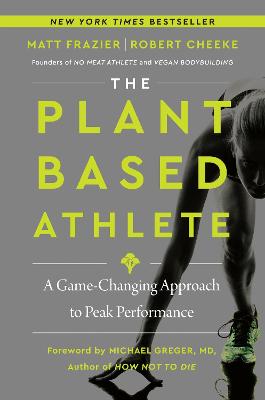
annieb123
Written on Jun 13, 2021
The Plant-Based Athlete is a well written examination of high end performance training in athletics with a particular eye toward the impact nutrition has on physiology and exertion. Due out 15th June 2021 from HarperCollins, it's 336 pages and will be available in hardcover, audio, and ebook formats. It's worth noting that the ebook format has a handy interactive table of contents as well as interactive links and references throughout. I've really become enamored of ebooks with interactive formats lately. It makes it so easy to find info with the search function.
This is a layman accessible, enthusiastically written, and evidence based monograph on the benefits and physiological practicality of a plant based diet for athletic training and performance. The authors, Robert Cheeke and Matt Frazier are experienced athletes and motivational speakers themselves who've made successful careers while following a plant-based diet and lifestyle.
The introductory chapters include a comprehensive list of former and current athletes who have followed no-meat lifestyles while training and performing at the highest levels of their respective sports. There is a necessary amount of technical information included in the chapters dealing with the physiology of nutrients and micronutrients; what our bodies use them for and the foods in which they're abundant. Calorie density of different food types is an important concept as well, and they do a good job of explaining why and how food types vary immensely in caloric content by weight and how to make informed choices to ingest what our bodies need without over or under eating.
They devote chapters to specific classes of macro-nutrients: proteins, carbohydrates, and fats as well as an interesting side-discussion of supplements and how/why/if to supplement. There are some general training and diet tips from several successful athletes as well as general encouragement and motivation.
The included recipes are arranged by meal: breakfast, lunch, dinner, desserts, and partial recipes/condiments/staples. Each recipe includes an introduction and contributor credits, ingredients arranged bullet style in a sidebar (measurements are in US standard only, no metric equivalents), followed by step-by-step preparation instructions. There are no serving suggestions or prep photos included in the book. Nutritional info per serving includes calories, protein, carbs, fat, and fiber. Recipe ingredients can be easily sourced at any well-stocked grocery store; nothing esoteric or difficult to find. The included recipes are -not- fancy - many are bowls or smoothies designed to fuel up the body and facilitate training and performance.
The book is very well annotated throughout and the chapter notes will provide readers with ample further reading.
Four stars. An enthusiastically and motivationally written book with very general recipes. The training content of the book is very general since it's not specifically aimed at any single sport. Readers will likely need more specific training advice as well as a broader selection of recipes (there are roughly 60 different recipes included, but many of them are quite similar). What the book does, and does well, is make a compelling argument for plant based nutrition being beneficial for health and performance.
Disclosure: I received an ARC at no cost from the author/publisher for review purposes.
